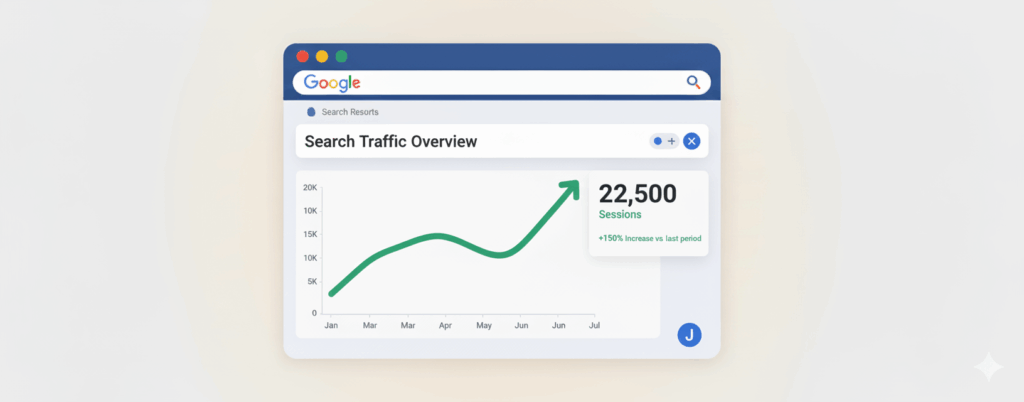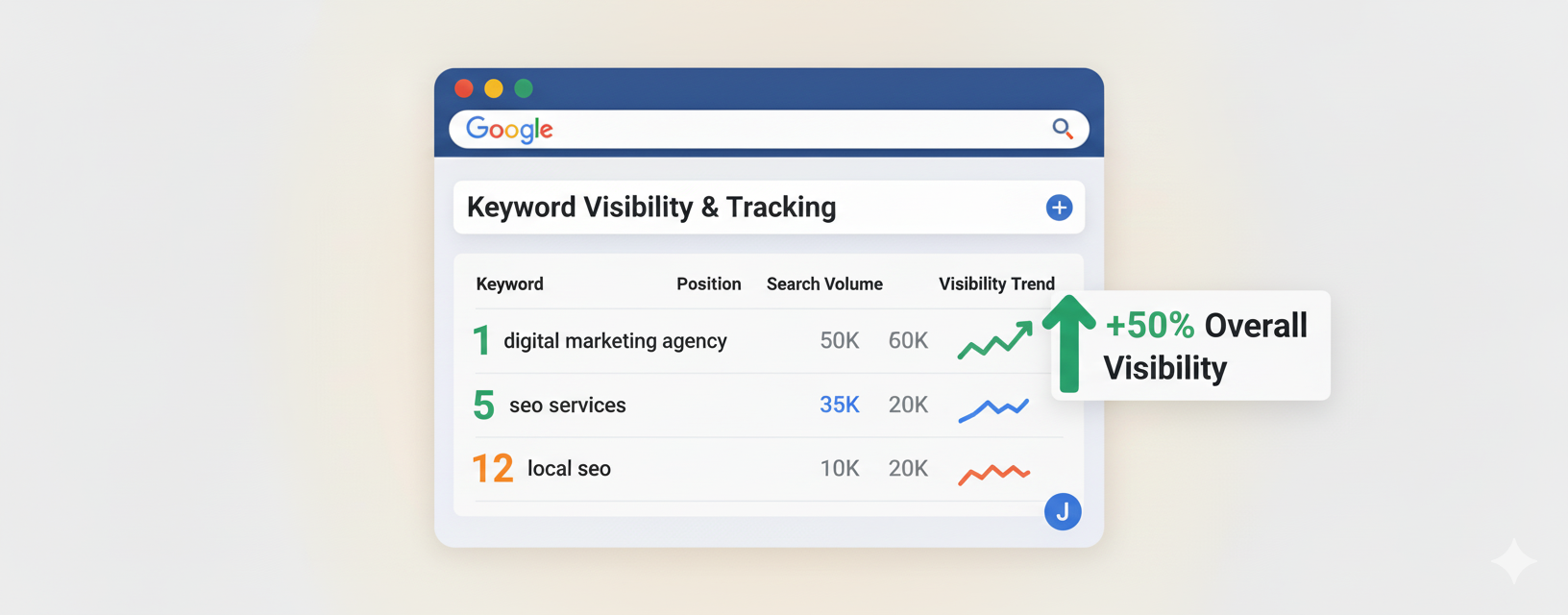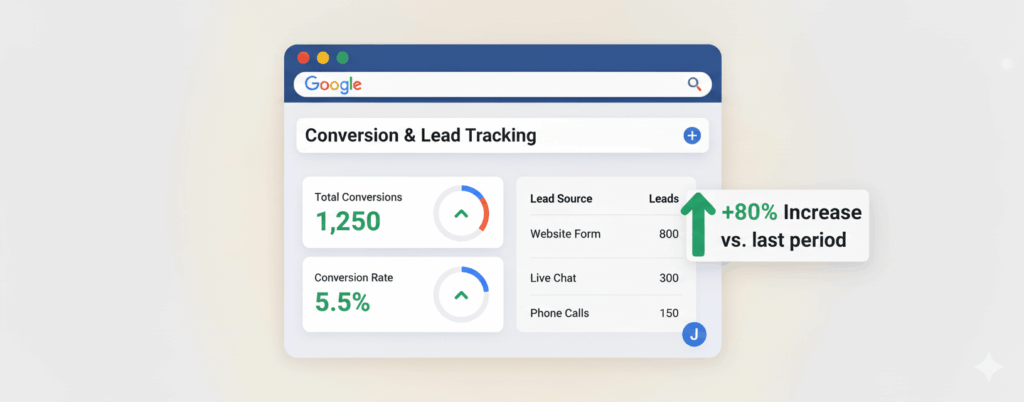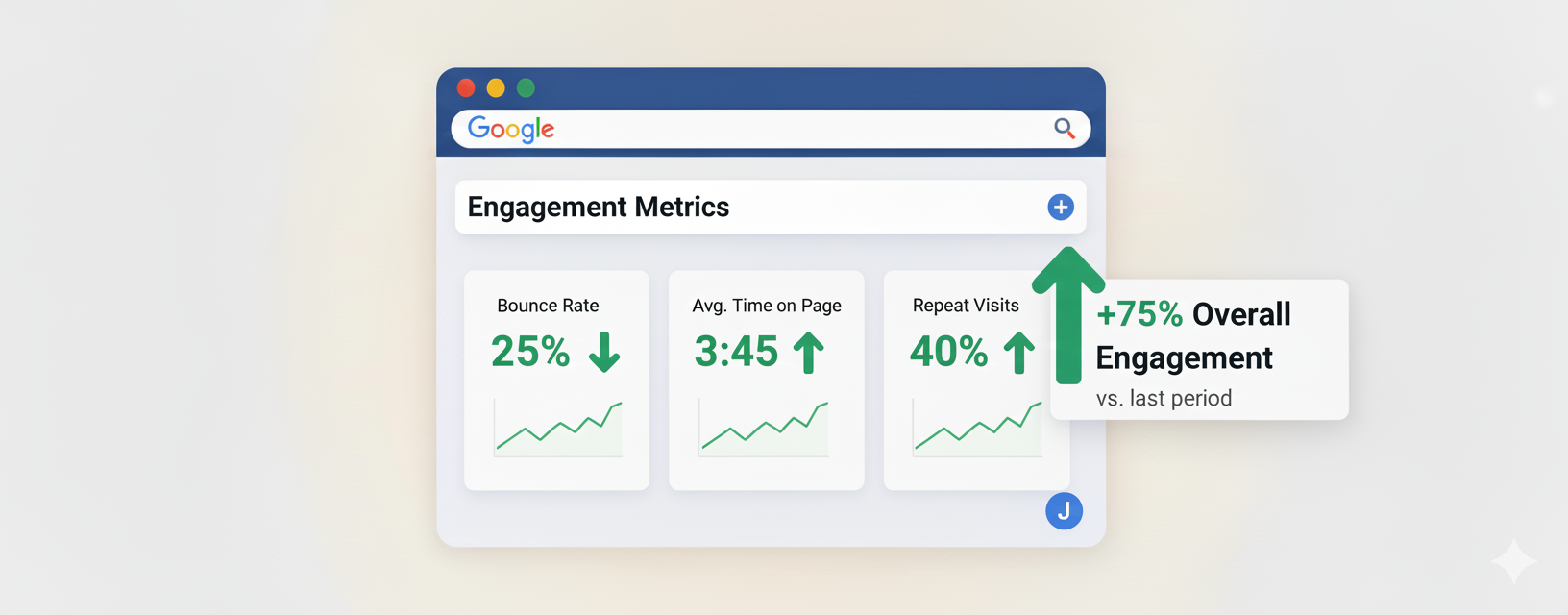Estimated reading time: 10 minutes
If you’re someone who’s been putting time and resources into search engine optimization (SEO), you’ve probably asked yourself at some point (maybe more than once): how do I know if my SEO is working? Unlike paid ads where results are immediate, SEO is more of a slow build, and it isn’t immediately obvious whether your efforts are paying off.
Maybe your rankings seem stuck, or you’re not sure which metrics really prove success. The good news is that there are a few signs you can look for that reveal whether your SEO strategy is on the right track.
Define Your Goals Before You Measure Success
Before you can decide whether your SEO is “working,” you first need to figure out what working actually means for you. Not every business wants the same outcome from SEO. For some, success looks like higher visibility and brand awareness. For others, it’s more leads, online sales, or foot traffic to a local store. Without clear goals in place, it’s like training for a marathon without knowing how far the race actually is—you’ll stay busy, but you won’t know if you’re winning.
The best way to define your SEO goals is to start with your bigger business objectives and work backward. Ask yourself:
- What do I want my website to accomplish in the next 6–12 months?
- Do I want more people to discover my brand or am I focused on getting people who already know me to take action?
- Am I trying to generate leads (like form fills, demo requests, or phone calls) or drive online sales?
- Is my priority to rank locally and bring more foot traffic into my physical location, or to grow visibility on a national/international scale?
- Which products, services, or content do I want to highlight?
- What does a successful visitor journey look like on my site?
Once you’ve nailed that down, you can set measurable targets—like increasing organic traffic from your city by 20%, growing email signups by 15%, or hitting a set number of sales directly from organic search. Defining your goals upfront makes it much easier to measure progress later and ensures your SEO strategy is aligned with what actually matters to your business.

5 Signs Your SEO is Working
Let’s focus on the positive – what you’re doing right! It’s easy to get wrapped up in the pressure of feeling like you’re behind or not reaching your full potential. This is especially difficult when you’re getting bombarded by industry “noise” that constantly claims you’re doing SEO wrong and that they’re the only ones that know how to do it right (a.k.a. probably a scam) .
The way I see it two things can be true – you could be doing a lot of SEO work that is helping you improve your online performance, but there may also be a lot of room to improve. Let’s dive into some of the key indicators you can look at to see if your SEO efforts are paying off.
Increased Organic Traffic – More Visitors From Search Engines Over Time
One of the easiest ways to spot SEO success is by looking at your organic traffic. If more people are finding your site through Google searches month after month, that’s a big win. Think of it like foot traffic to a store—the more visitors coming through the door, the more chances you have to make a sale. When SEO is done right, that steady stream of search traffic becomes one of the most cost-effective ways to gain new customers.
Of course, traffic alone doesn’t tell the whole story. You’ll want to pay attention to where that traffic is coming from and whether it’s relevant. For example, if you run a local business in St. Louis, it won’t do you much good if most of your new visitors are from across the globe. Tools like Google Analytics can help you see which pages are pulling in visitors, what cities they’re coming from, and whether they’re sticking around once they get there. That’s when you know your SEO is attracting the right crowd.

Improved Keyword Rankings – Tracking Visibility for The Most Relevant Keywords
Climbing the ranks on Google is another great sign that your SEO is working. When your target keywords start showing up higher in search results, it means your content is hitting the right audiences. It’s like being moved from the back row to the front row in a concert—suddenly, you’re a lot more visible. And when people can actually see your site in search results, they’re far more likely to click and explore what you have to offer.
But not all keywords are created equal. Being #1 for a phrase no one searches for won’t change your business, while ranking well for high-value keywords can have a major impact. That’s why tracking keyword rankings isn’t just about celebrating upward movement—it’s about making sure the right terms are moving. Monitoring your keyword performance regularly helps you understand what’s working, what’s lagging, and where you should put your energy next.

Higher Click-Through Rates (CTR) – Better Alignment Between Search Intent and Your Content
Ranking is one thing, but getting people to actually click is where the magic happens. A higher CTR means your title tags and meta descriptions are catching attention and convincing searchers to choose your result over the competition. It’s like having the best-looking booth at a crowded market—people can’t help but stop by and see what you’re offering. A strong CTR shows that your message matches what people are searching for and that your SEO strategy is tuned into real user intent.
Improving CTR often comes down to fine-tuning the little details. Catchy, clear headlines paired with descriptive, benefit-driven meta descriptions can make a huge difference. Even adding structured data (like star ratings or FAQs) can give your result more “real estate” on the search page. The more appealing your result looks, the more likely people are to click. That’s when you know your SEO isn’t just about visibility—it’s about sparking curiosity and winning clicks.

More Conversions and Leads – A Universal Performance Indicator
Traffic is great, but leads and sales are even better. If your SEO efforts are bringing in visitors who actually fill out forms, sign up for demos, or make purchases, you know you’re attracting the right audience. That’s the whole point of SEO—it’s not just about being seen, it’s about being chosen.
Conversions and leads are a pretty universal performance indicator for businesses of all sizes and industries; the main difference is simply the type of conversion you’re after. For an e-commerce brand, it might be purchases. For a B2B company, it could be demo requests or consultation calls. For a local business, it may be phone calls or foot traffic from people who found you online. No matter what it looks like, when you start to notice that organic search traffic is generating real business outcomes, it’s a surefire sign your strategy is moving in the right direction.

Stronger Engagement Metrics – Lower Bounce Rates, Longer Time on Site, Repeat Visits
Lastly, check how people are behaving once they land on your site. Are they sticking around to read more? Clicking to other pages? Coming back for another visit? These engagement metrics show that your content is resonating. When users spend more time with your brand, it’s a strong sign that your SEO isn’t just driving clicks—it’s building connections. Think of it as the difference between a window shopper and a loyal customer who browses every aisle.
Good engagement means your site is doing its job: answering questions, solving problems, and making people want to stick around. Tools like Google Analytics can show you bounce rates, average session duration, and pages per visit. If those numbers are improving, your content is probably hitting the mark. And when people come back again and again, it shows you’re building trust, not just attracting attention.

How Long Does It Take to See SEO Results?
Aside from “How do I know if my SEO is working?”, this is another one of the most common questions we get from clients and less experienced marketers. The honest answer: SEO is a long game.
Unlike paid ads, which can drive traffic almost immediately, SEO takes time to build momentum. Search engines want to see consistent, high-quality signals—like strong content, healthy backlinks, and good user experience—before they start rewarding your site with higher rankings. The most effective SEO strategies aren’t designed to deliver quick, short-term wins. They’re built for sustainable growth that compounds over time.
For most businesses, the typical timeline is around 3 to 6 months before you see noticeable improvements in traffic and rankings. In highly competitive industries (like finance, law, or healthcare), it can take even longer to break through. That doesn’t mean your SEO isn’t working in the meantime—it just means the groundwork is being laid. Each new piece of optimized content, technical fix, or backlink is like adding a brick to your foundation. The payoff comes when those bricks stack up, and suddenly you have a strong, stable presence that keeps working for you long after the initial efforts are complete.
Final Thoughts
At the end of the day, knowing whether your SEO strategy is working comes down to tracking the right signals and adapting as you go. The key indicators mentioned above will give you a clearer picture of what’s working and where you can improve.
Just remember, SEO isn’t an overnight fix; it’s a long-term strategy that rewards consistency, patience, and smart adjustments. The more time and effort you put into building a strong foundation, the more lasting results you’ll see.
If you’re still asking yourself “How do I know if my SEO is working?”—or you feel like you’re spinning your wheels—we can help! Whether you’re a business owner trying to generate leads or a marketing professional who wants expert backup, our team knows how to spot what’s working, fix what’s not, and build a strategy that actually delivers. Book a free 30-minute strategy session with us today, and let’s turn your SEO strategy into a driver of real results.
Key Takeaways
- Start with goals: Define what you want out of SEO—brand awareness, leads, sales, or local visibility—so you know what success means for your business.
- Look for the right signals: Increased organic traffic, improved keyword rankings, higher click-through rates, more conversions, and better engagement are all signs your SEO is working.
- Conversions matter most: Leads and sales are the universal measure of success, though the type of conversion varies by industry and business model.
- Use the right tools: Google Analytics and Google Search Console are essential for tracking performance and connecting SEO to business outcomes.
- Play the long game: Most businesses see noticeable SEO improvements in 3–6 months, but the real wins come from consistent, long-term effort.
- Get expert help if needed: If you’re not sure whether your SEO is paying off, working with an experienced team can help identify gaps and build a strategy that works.



